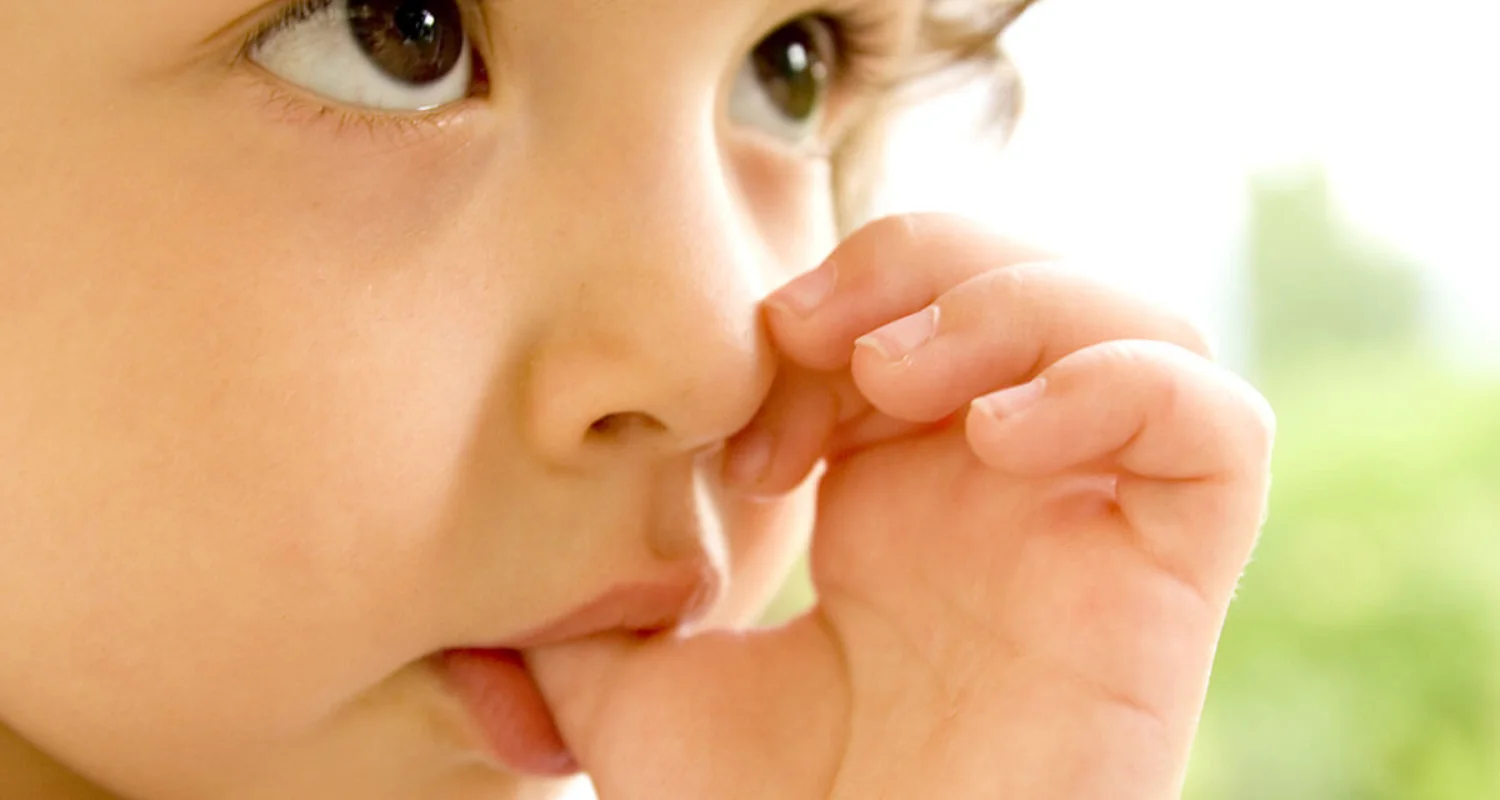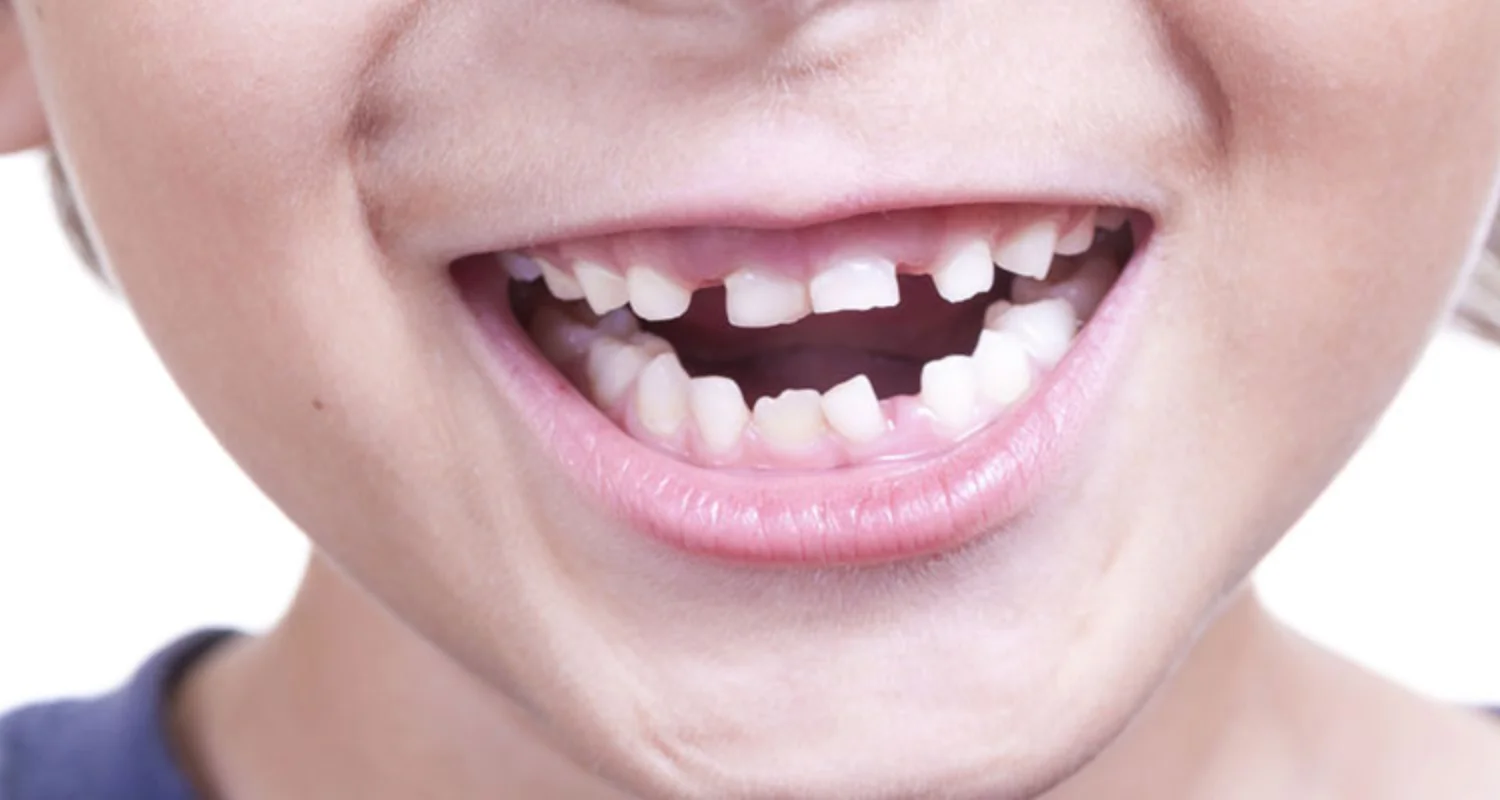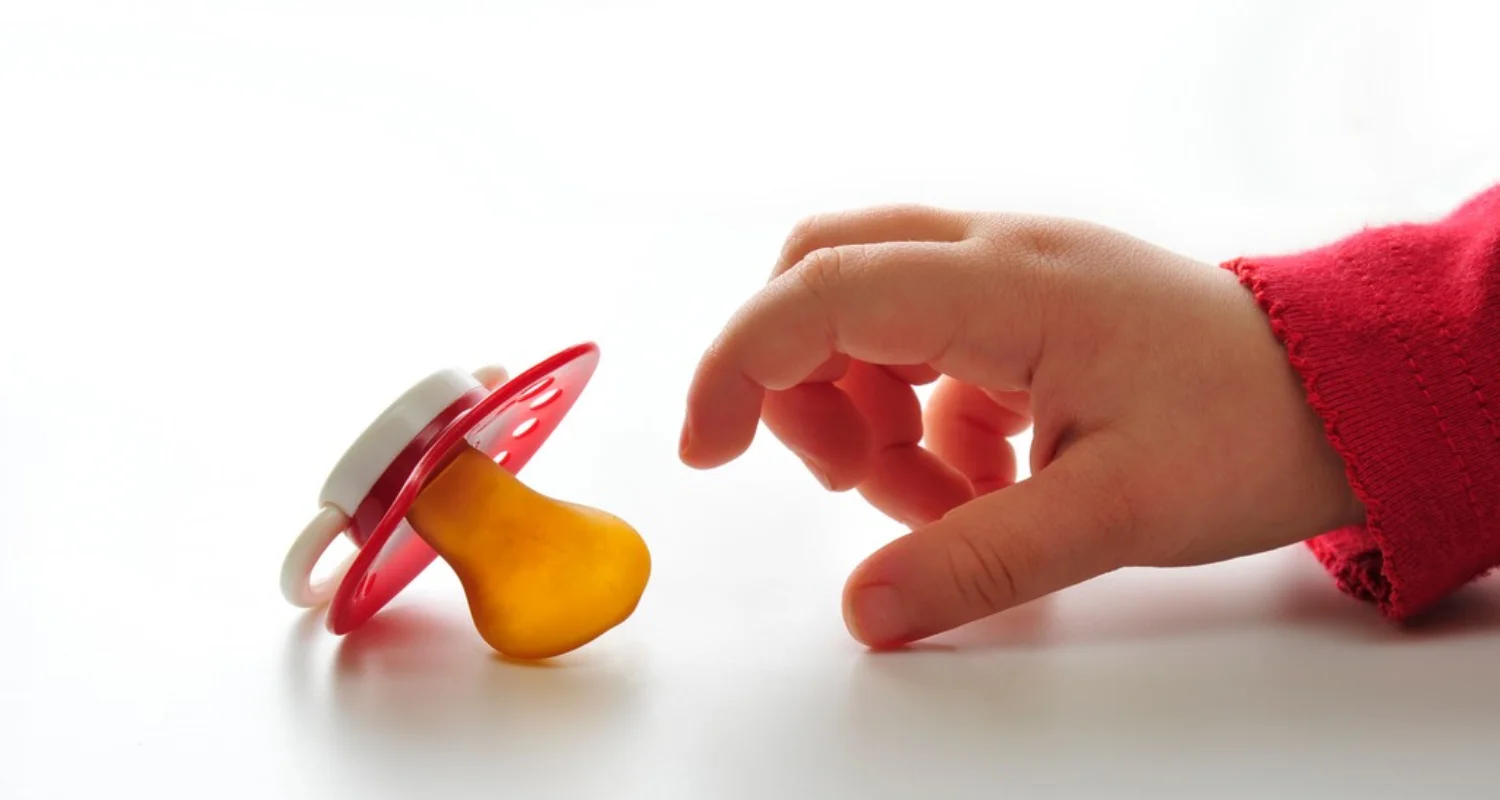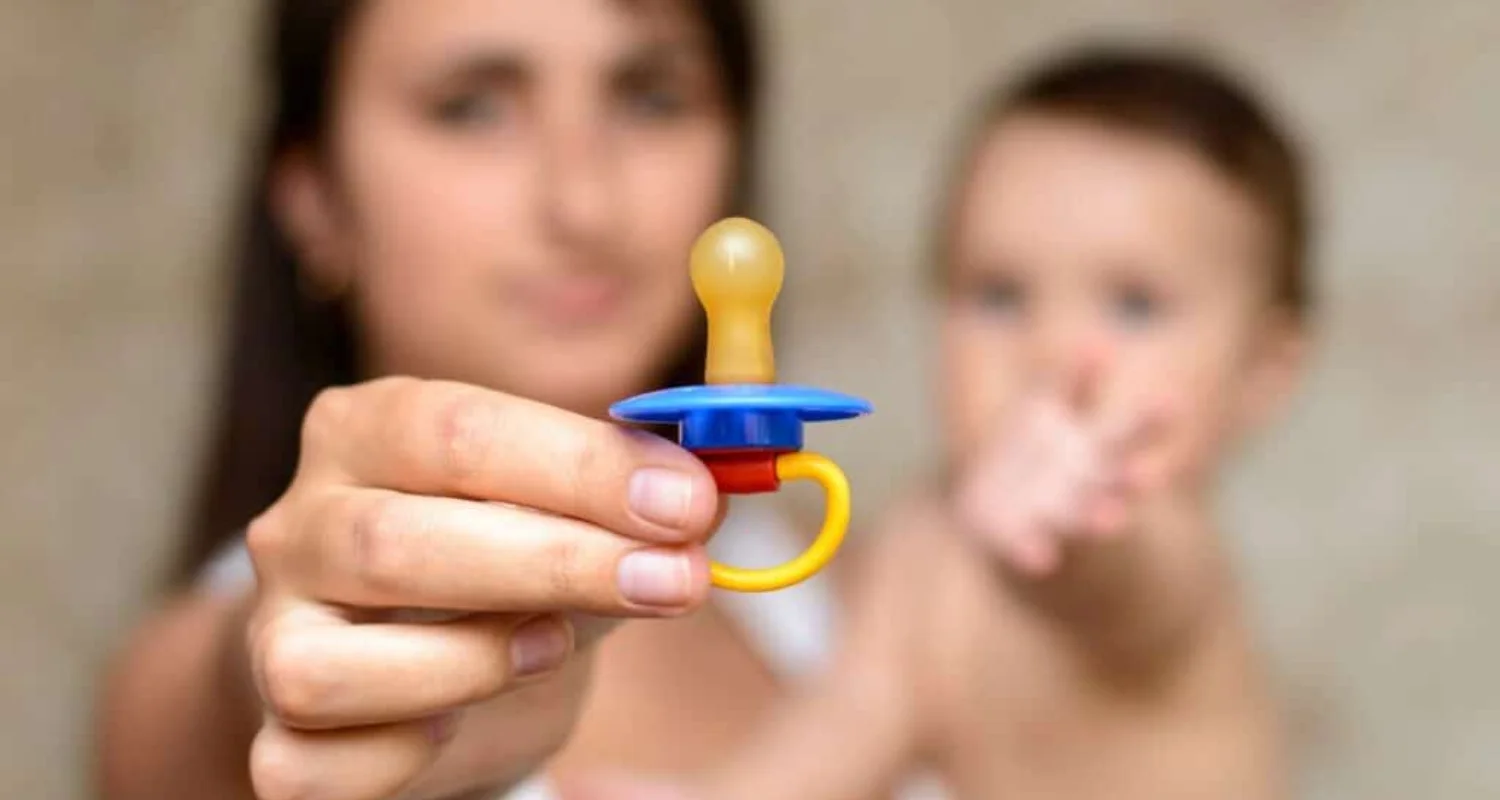Last Updated on: 20th December 2025, 07:24 am
Thumb sucking and pacifier use are natural in babies, but if prolonged, they can affect dental development. Learn how to manage these habits and protect your child’s smile.
All babies are born with a natural need to suck, which plays a crucial role in their ability to eat and drink. For many infants, sucking has a calming effect. As a parent, you might be concerned about your child’s thumb sucking or pacifier use, wondering if it’s harmful, when it should stop, or the consequences if it continues.
While thumb sucking and pacifier use are normal behaviors in infancy, prolonged habits can put pressure on the teeth and jaws, potentially leading to bite problems and other dental issues. Regular thumb, finger, pacifier, or tongue sucking can affect the development of your child’s teeth and jaw, with some changes in bone structure visible as early as 18 months.
In this article, we’ll explore the effects of thumb sucking and pacifiers, along with tips for managing these habits to prevent long-term effects.
Why do Children like Thumb Sucking and Pacifiers?
From birth, babies have a natural sucking reflex. The baby will try to satisfy this need with the mother’s breast, a pacifier, a thumb, or another. However, many Dental Associations support parents in the decision to introduce a pacifier. The controlled action of sucking is not only a vital reflex for the baby to obtain food, but it also promotes feelings of security and allows infants to self-soothe and initiate the process of self-regulation.
Pacifiers and thumb sucking: the positive side!
While pacifiers and thumb sucking are often reviled for their potential risks of dental problems, they offer certain benefits. Experts have identified four specific advantages of pacifiers — and even thumb-sucking:
● Self-soothing
Pacifiers are an excellent way to teach a baby to self-soothe. Many times, they give parents a valuable break.
● Help in weaning
Pacifiers may come in handy when weaning a baby off breastfeeding. However, a suitable nursing regime must be established; this usually occurs in the first 3 to 4 weeks before initiating a pacifier on a newborn.
● Prevention of SIDS
Some of the advantages of its use include being associated with reduced risk for sudden infant death syndrome (SIDS). The American Academy of Pediatrics recommends the introduction of a pacifier during napping and at bedtime.
The pacifier should not be attached to straps, clothes, or toys because such attachments can pose a risk of choking or strangulation.
● Comforting Premature Infants
For premature babies, particularly those in the neonatal intensive care unit, sucking on pacifiers can be comforting. Research from 2012 indicated that premature babies who received pacifiers advanced from tube feeding to nursing more quickly and were discharged from the NICU earlier than those who were not given pacifiers.
Note: Do not provide pacifiers for healthy babies who are having difficulty nursing unless a healthcare provider or lactation consultant recommends it.
What are the Effects of Thumb Sucking on Oral Development?
Thumb sucking is a natural, non-nutritive reflex, and it often starts early after birth. Very comforting and reassuring to the child, long-term thumb sucking can lead to quite a few dental problems and can even persist into adulthood, affecting the teeth and jaw.
Some common dental issues faced by thumb suckers include:
- The upper jaw extends further than normal.
- Upper front teeth protrude outward, resulting in an overbite.
- Lower front teeth tilt inward instead of aligning straight.
- A gap between the upper and lower teeth develops, affecting the bite
- Difficulty bringing the front teeth together to bite.
- The roof of the mouth becomes narrower and higher.
- A lisp develops.
- The tongue is positioned abnormally.
During the first year, about one in three babies suck their thumb, with most children naturally stopping between ages two and four. However, by age eight, only one in 20 has the habit.
If your child continues thumb-sucking as their baby teeth come in, it’s important to consult a dentist. They may want to monitor your child’s dental development closely to prevent potential complications.
How Does Pacifier Use Impact Your Child’s Teeth?
Did you know? The use of pacifiers in some developed countries is so culturally established that the prevalence is up to 42.5% in young children by the age of 12 months! That’s a lot, isn’t it? While pacifiers offer several benefits, they can also lead to dental issues, especially if used for too long, such as:
Misaligned bites:
- Overuse can cause bite misalignment, such as crossbites, open bites, or other malocclusions.
- Prolonged pacifier use may shift teeth and alter the shape of the palate.
- A 2001 study found that 71% of children who continued pacifier use or thumb-sucking past age 4 had malocclusion.
- Only 36% of children who stopped by ages 3 to 4, and just 14% of those who stopped by 24 months, showed signs of malocclusion.
Gingival recession and cavities:
- In extreme cases, pacifier use has been linked to gum recession and cavities.
- These issues often occur when pacifiers are dipped in sweet substances, leading to sugar exposure, plaque buildup, and cavities.
How Can You Help Your Child Stop Thumb Sucking?
Use one or more of these approaches to help your child break thumb-sucking:
Substitute the habit
Because thumb-sucking often is an unconscious activity, encourage the habit of making fists or holding a small special toy in the hand.
Use rewards
Set specific goals with your child and reward your child for not sucking his or her thumb for a specified amount of time. Positive reinforcement, through the use of a sticker chart, small rewards, or fun surprises, can motivate them to continue.
Gently remind your child
Whenever you notice them sucking, calmly steer them away from it without threatening or punishing them.If these approaches are unsuccessful, talk to your pediatric dentist. They may prescribe an orthodontic appliance to make the teeth eventually shift in response to this habit, provide a bitter medication to put on the thumb, or even prescribe a thumb guard.
If you decide to try one of these approaches, you should discuss these options with your provider first.
What Are the Best Tips for Using Pacifiers the Right Way?
Pacifiers can be safely used if you maintain hygiene and wean your baby off them at the right time, that is about 3 years of age according to the American Academy of Pediatric Dentistry.
Follow these tips for safe use:
Avoid sharing
Don’t share pacifiers between children. This can spread bacteria, leading to cavities and infections. Also, don’t forget to replace it every 4-6 weeks.
No sugary dips
Resist the temptation to dip pacifiers in sweet substances, as sugar exposure can cause cavities.
Choose the right size
Pacifiers now come in different sizes for different age groups. Using the correct size helps avoid choking hazards and ensures a better fit.
Which is worse: pacifier use or thumb sucking?
Vigorous thumb-sucking can lead to dental issues similar to those caused by pacifier use. However, a 2016 study found that pacifier use carries a higher risk of developing malocclusion when compared to digit sucking.
In the end, both habits can be harmful over prolonged use and should be monitored closely.
Takeaway
Thumb-sucking and pacifier use are natural behaviors in infants but they can lead to dental issues if prolonged, such as bite misalignment and jaw changes. To minimize risks, it’s important to wean children off these habits at the appropriate age, maintain proper hygiene, and avoid sugary substances. Consulting a dentist for guidance on managing these behaviors will ensure healthy oral development.
Frequently Asked Questions
Will long-term use of a pacifier affect the shape of a child's mouth and the development of their teeth?
What is worse for teeth: pacifier or thumb?
Both pacifier use and thumb-sucking can lead to dental problems if prolonged, but pacifier use is generally considered to pose a higher risk of developing malocclusion as compared to thumb-sucking. However, both habits can cause similar dental issues, such as misalignment of teeth and changes in the shape of the palate.
Does a pacifier affect the mouth?
Yes, pacifiers can affect the development of the mouth if used for too long. They may alter the shape of the palate, cause misaligned bites, and, in extreme cases, lead to gum recession or cavities, especially if dipped in sweet substances.
Should I try to stop my baby from thumb sucking?
Yes, it’s advisable to gradually discourage thumb-sucking, especially as your child’s teeth begin to come in. Prolonged thumb-sucking can lead to overbites, jaw misalignment, and speech issues. Consulting with a dentist for strategies to stop the habit can help protect your child’s dental health.
Voice and Search (Q&A)
What age should a child stop using a pacifier to avoid dental problems?
Most experts recommend stopping pacifier use by age 3 to prevent bite issues and misalignment of the teeth and jaw.
How can I help my child stop thumb sucking naturally?
Use gentle reminders, offer rewards, and provide comforting alternatives like a small toy. Avoid punishments and talk to your dentist if needed.
Can thumb sucking cause speech problems in kids?
Yes, prolonged thumb sucking can affect the position of the tongue and teeth, which may lead to lisps or delayed speech development.
Share:
References
1. Schmid, K. M., Kugler, R., Nalabothu, P., Bosch, C., & Verna, C. (2018). The effect of pacifier sucking on orofacial structures: a systematic literature review. Progress in orthodontics, 19(1), 8. https://doi.org/10.1186/s40510-018-0206-4
2. Smith-Garcia, D. (April, 2021) What You Need to Know About Pacifiers and Dental Problems. Healthline. https://www.healthline.com/health/pacifier-teeth#age-to-wean
3. What to Know About Effects of Thumb Sucking on Teeth. (June, 2023). WebMD. https://www.webmd.com/oral-health/what-to-know-thumb-sucking-impact-teeth
4. Leber, C. (August, 2022). Pacifiers and Teeth: How Do Pacifiers & Thumb Sucking Impact Dental Development? American Association of Orthodontists. https://aaoinfo.org/whats-trending/can-pacifiers-and-thumb-sucking-affect-my-childs-teeth/
5. Ling, H. T. B. (August, 2018). The association between nutritive, non-nutritive sucking habits and primary dental occlusion. BMC oral health, 18(1), 145. https://doi.org/10.1186/s12903-018-0610-7
-
Nayibe Cubillos M. [Author]
Pharmaceutical Chemestry |Pharmaceutical Process Management | Pharmaceutical Care | Pharmaceutical Services Audit | Pharmaceutical Services Process Consulting | Content Project Manager | SEO Knowledge | Content Writer | Leadership | Scrum Master
View all posts
A healthcare writer with a solid background in pharmaceutical chemistry and a thorough understanding of Colombian regulatory processes and comprehensive sector management, she has significant experience coordinating and leading multidisciplina...



















